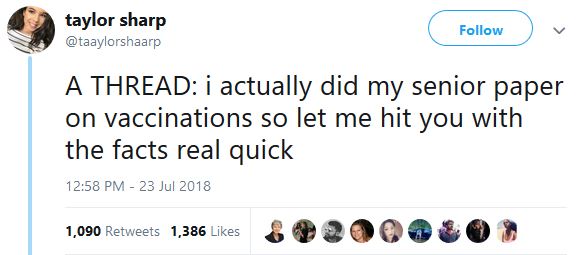
Vaccinations: It really shouldn't be a sensitive subject, but unfortunately it is. Just casually mentioning vaccines around an adult with a differing opinion is a great way to start fights and lose friends.
But the facts are the facts: An afternoon of reading real medical studies is enough to prove beyond a reasonable doubt that vaccines are a good thing for children. There is no debate to be had, because the doubters don't have hard facts.
You know we're in a sad state of affairs when teenagers have to break topics like this down for us, but that's exactly what Taylor Sharp did. The recent high school graduate wrote her senior paper on the subject of vaccines. After doing research and gathering information, she came to one clear conclusion: They are not bad for kids.
She shared the facts about vaccinations on Twitter and ended up schooling a lot of adults with her knowledge:
Everyone, say hi to Taylor.

Brace yourself for the truth bomb she's about to drop on the internet.

Notice that none of those diseases mentioned are mild little bugs. These are serious illnesses with fatal repercussions.
The day may come when the world has eradicated these diseases, but that day is not today. What's more, some of them are actually getting worse.
Considering we have the means to stop these diseases, it's crazy that they still infect people.
We've all had what feels like a deathly cough before, but whooping cough is a far more serious matter.

This is the really scary one, because it is wildly contagious and seriously dangerous. But because of some parents' fears about vaccinating, the number of cases of an already solved problem are climbing again.

Its resurgence is more complicated than simply giving everyone shots — and the implications should make you angry.
Now, a quick explanation of herd immunity:
Simple enough, right? If no one around you can get sick, then it doesn't matter if you're actually vaccinated — the odds of you getting sick are extremely low. This is a common justification for parents choosing not to vaccinate.
While most people believe in vaccinating their children, it's common for isolated communities to be against vaccines. This means there's a large group of unprotected children in a tight location — the opposite of herd immunity — which is a recipe for an outbreak.
And here's where you should get upset: Herd immunity is most beneficial to those who physically can't get vaccines because they're too young or sick. It's not an excuse for people to willingly skip vaccinations; it's a defense for those who can't get them for health reasons.
When parents choose not to vaccinate their children, the strength of the herd immunity falls, putting these already at-risk people in serious danger.
Here's an example to further get your blood boiling:
Seeing the problem yet?

So parents who don't vaccinate aren't just putting their own children at risk, they're putting the sick and weak in their communities at even higher risk than their own kids.

Taylor breaks down the myth about autism in the original thread — long story short, there's a lot of proof showing the exact opposite of that claim.

She's also willing to talk about the individual ingredients that sometimes scare people, explaining the reasons why each of these is put in the vaccines and giving examples of how nontoxic they really are.
This should all be common sense, but 2018 is a crazy time to be alive, so thank goodness we have people like Taylor willing to patiently break it down for us.




